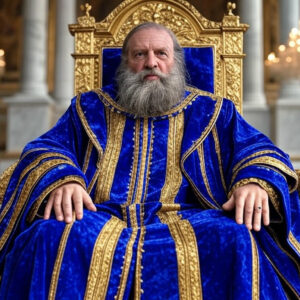Someone o nce said that when we discover the center of the universe, a lot of people will be disappointed to find they are not in it. How many people today believe they are the center of everything? How many people today aren’t caught up in the sin of pride? Listed as one of the seven deadly sins, we can turn back to the beginning pages of the Bible and see the same pride exhibited there as we see all around us. Pharaoh once announced, “Who is the Lord, that I should obey him?” (Exodus 5:2). Nebuchadnezzar likewise boasted, “Is not this the great Babylon I have built as the royal residence, by my mighty power and for the glory of my majesty?” (Daniel 4:30). To Herod Agrippa I the people shouted, “This is the voice of a god, not of a man” (Acts 12:22). It should be of interest to note that not long after Pharaoh and Herod said these things, they were struck dead and Nebuchadnezzar became a crazed man.
nce said that when we discover the center of the universe, a lot of people will be disappointed to find they are not in it. How many people today believe they are the center of everything? How many people today aren’t caught up in the sin of pride? Listed as one of the seven deadly sins, we can turn back to the beginning pages of the Bible and see the same pride exhibited there as we see all around us. Pharaoh once announced, “Who is the Lord, that I should obey him?” (Exodus 5:2). Nebuchadnezzar likewise boasted, “Is not this the great Babylon I have built as the royal residence, by my mighty power and for the glory of my majesty?” (Daniel 4:30). To Herod Agrippa I the people shouted, “This is the voice of a god, not of a man” (Acts 12:22). It should be of interest to note that not long after Pharaoh and Herod said these things, they were struck dead and Nebuchadnezzar became a crazed man.
Pride is defined as a sense of one’s own dignity or value. Scripture mentions the word nearly 70 times. Pride has been the downfall of many of God’s people. And so it was in the case of King Uzziah.
Uzziah, also called Azariah, was Judah’s 11th king. He was only 16 years old when he took the yoke of government on his shoulders. Scripture tells us that at first “he did what was right in the eyes of the Lord. . . . As long as he sought the Lord, God gave him success” (26:4,5). Uzziah built his reputation on doing the right thing. The Bible tells us that “God helped him against the Philistines and against the Arabs” (26:7). He “built towers in Jerusalem at the Corner Gate . . . and at the angle of the wall. . . . He also built towers in the desert and dug many cisterns. . . . He had people working his fields and vineyards in the hills and in the fertile lands, for he loved the soil. Uzziah had a well-trained army. . . . In Jerusalem he made machines designed by skillful men . . . to shoot arrows and hurl large stones. His fame spread far and wide” (26:9-15). Uzziah was everything the people hoped he would be. Truly he was a great man.
But Uzziah also had a dangerous flaw. The writer of 2 Chronicles tells us that “he was greatly helped until he became powerful” (26:15). Uzziah suffered from the sin of pride. He could not handle the success God had given to him, and it cost him dearly. In the very next verse we read, “After Uzziah became powerful, his pride led to his downfall” (26:16).
The problem came to a head when Uzziah entered the temple to burn incense. This duty was reserved exclusively for the Levites who were designated by God to perform it. Uzziah held the smoky censer in his hand as he was approached by a priest. Within moments, “leprosy broke out on his forehead” (26:19). Uzziah had instantly become a leper because of his sin of pride. What was he thinking? Why did he do it? He knew his place was not in the temple. That question could be asked of many of us. Society builds us up by flaunting our beauty. Parents place their youngsters on pedestals to show off their achievements. Schools brag about their star athletes. Young people show proud contempt of their elders. Pride saturates our society. What a lesson we can learn from Uzziah, who lived the remainder of his life in a “separate house—leprous, and excluded from the temple of the Lord” (26:21). What a sad end for a man who once lived his life for the Lord until fame and power brought him down.
We should always put to heart the instruction of Paul, who said, “Let him who boasts boast in the Lord” (1 Corinthians 1:31).
Pride and sin, lurk within,
All your hopes to scatter;
Heed not when they flatter.
(from “Rise, My Soul, to Watch and Pray”)
